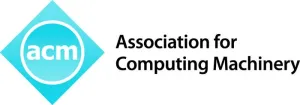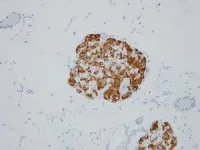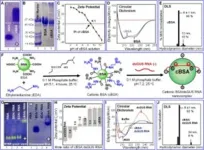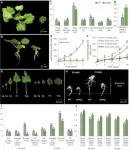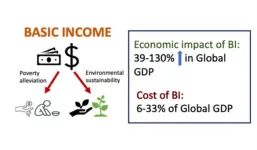World's leading technology associations publish comprehensive curricular guidelines for computer science at the undergraduate level
Growing importance of artificial intelligence reflected in CS2023 Curricular Guidelines
2024-06-07
(Press-News.org) ACM, the Association for Computing Machinery, has joined with the IEEE Computer Society (IEEE-CS) and the Association for the Advancement of Artificial Intelligence (AAAI) to develop “Computer Science Curricula 2023” (CS2023). CS2023 provides a comprehensive guide outlining the knowledge and competencies students should attain for degrees in computer science and related disciplines at the undergraduate level.
Establishing uniform curricular guidelines for computer science disciplines is viewed as being essential to the ongoing vitality of the field and the future success of the students who study it. Shared global curricula ensures that students develop the knowledge and skills they need to succeed as they graduate to become industry practitioners, researchers, or educators. Additionally, by supporting consistency in the field across the world, the curricular guidelines enable efficient global collaboration—whether among professionals working across borders for an international company, or among academics from different nations coming together for a research project.
Customarily, these guidelines are updated every ten years. CS2023 builds on CS2013, the most recent global curriculum framework developed by ACM and IEEE-CS, the world’s two largest associations of computing professionals. ACM and IEEE-CS have consistently focused on curating content from the world’s foremost experts for the creation of curricular guidelines, and with the rapid expansion of AI since CS2023, the addition of AAAI to the developing body was both essential and welcome.
New and Noteworthy additions of the CS2023 report include:
The addition of AAAI as a core partner of CS2023 reflects the growing importance of artificial intelligence as a discipline, as well as how AI is disrupting the teaching of computer science.
Because computing touches so many aspects of personal and public life, CS2023 goes beyond simply outlining technical competencies to include a knowledge unit called Society, Ethics, and the Profession (SEP) and incorporating it in most other knowledge areas to encourages educators and students to consider the social aspects of their work.
To meet the disciplinary demands of artificial intelligence and machine learning, mathematical and statistical requirements have been increased throughout CS2023, but individually identified for each knowledge area so that educators can accommodate the needs of students with varying levels of mathematical background.
CS2023 is designed to be a primarily online resource at https://csed.acm.org/, both for utility and so the curricular guidelines can be updated more frequently to keep pace with the rapid changes in the field.
“So much has changed in computing since we issued the last curricular guidelines in 2013,” explained Amruth Kumar, Professor, Ramapo College, and Steering Committee Co-Chair, CS2023. “While the core skills and competencies that we outlined in 2013 form the foundation of this new work, we were painstaking in our effort to make sure that we reflect where computing is today. We also tried to emphasize a whole solution approach in terms of addressing issues of Society, Ethics, and the Profession, and a whole person approach in terms of emphasizing the need for students to develop professional dispositions. Finally, from the outset, we envisioned this report as a living document that will be regularly updated and can be accessed by computer science educators on an ongoing basis.”
The development of CS2023 was guided by a global Steering Committee of 17 computing professionals who were drawn from academia and industry through a selective application process. The project began in 2021 by analyzing the results of a purpose-built computing community survey that included 427 academic and 865 industry respondents from around the world. Each Steering Committee member then led the development of the curricular guidelines for a specific knowledge area. Each knowledge area reflects a core discipline within computer science, such as security, data management, and foundations of programming languages. The final version of CS2023 includes community feedback collected through additional surveys, various ACM Special Interest Groups and other conferences and venues, and an online portal for open and general comments.
“Curricular frameworks must simultaneously meet the needs of educational institutions and industry and are most valuable when their development includes experts from these types of organizations and the collaboration of the wider computer science community,” said Alison Derbenwick Miller, Co-Chair, ACM Education Board. “Throughout the development of CS2023, ACM and our partners worked to ensure broad involvement, including industry professionals. We focused on curricular guidelines—what students should know—as well as curricular practices and why students need specific knowledge. In addition, we were excited to be able to include supplemental materials such as curricular practice articles, which are particularly important to address emerging technologies in a rapidly changing field like computer science.”
CS2023 also noted the specific challenges computer science educators have faced in recent years, including faculty recruitment and retention, AI generation of code and its implications, and how educators can manage workload challenges in the face of explosive enrollments.
“CS2023 is the culmination of three years of dedication and hard work by many subject matter experts,” added Elizabeth K. Hawthorne, Professor, Rider University and Co-Chair, ACM Education Board. “We thank everyone who volunteered their time in such an important effort—from the Steering Committee and taskforce members to the reviewers, and everyone who offered guidance and feedback along the way. We know that computer science educators will see this as a critical resource that will move our field and students forward.”
About ACM
ACM, the Association for Computing Machinery, is the world’s largest educational and scientific computing society, uniting computing educators, researchers, and professionals to inspire dialogue, share resources, and address the field’s challenges. ACM strengthens the computing profession’s collective voice through strong leadership, promotion of the highest standards, and recognition of technical excellence. ACM supports the professional growth of its members by providing opportunities for life-long learning, career development, and professional networking.
###
END
ELSE PRESS RELEASES FROM THIS DATE:
2024-06-07
Online education is effective for teaching complicated topics like quantum information science (QIS) to high school science educators, according to a new paper by University of Texas at Arlington researchers published in The Physics Teacher.
“COVID-19 forced educators to adjust their educational best practices to an unfamiliar virtual classroom, and professional development was no different,” said Karen Jo Matsler, assistant professor in practice for UTeach at UTA and lead author on the study.
Ramon Lopez, professor of physics, was coprincipal investigator ...
2024-06-07
In a major advancement for plant biology and agriculture, researchers have developed a novel method for systemic gene silencing in plants using engineered dsRNA-protein nanoparticles. This technique, which rapidly characterizes gene functions, could revolutionize in planta gene editing. The new approach addresses the longstanding challenge of transporting RNA molecules across plant cell membranes, providing a faster, non-transgenic solution for enhancing crop productivity.
Gene silencing in plants has faced significant challenges, primarily due to the difficulty of transporting RNA molecules across plant cell membranes and achieving systemic effects. Traditional genetic engineering ...
2024-06-07
Research has shown that, when nurses feel they are being prevented from taking a morally justifiable action or achieving an ethical outcome, it contributes to poor mental health, burnout, and intent to leave one’s job. Surveys from the COVID-19 pandemic found that a shortage of personal protective equipment (PPE) and lack of perceived support from hospital administrators were associated with higher levels of this moral distress.
University of Pennsylvania School of Nursing researchers and their collaborators hypothesized that nurses working in hospitals where Black patients predominantly access care—which they call Black-serving hospitals, or ...
2024-06-07
In a recent study, scientists have unlocked the secrets behind the diverse flavors of table grapes. By examining 38 different cultivars, the research offers unprecedented insights into the volatile compounds that shape our taste experiences, paving the way for enhanced grape quality and flavor.
The flavor of table grapes, influenced by various volatile compounds, plays a significant role in consumer preference and marketability. Traditional flavor analysis methods often fail to capture the complexity and diversity of grape flavors, especially in hybrid varieties. Conventional flavor classifications like muscat and foxy are insufficient for describing the wide range of flavors ...
2024-06-07
Unlocking the secrets of nature, a pioneering study has pinpointed a gene mutation with profound implications for plant height and stress tolerance. The discovery lies in the CpDWF5 gene, whose alteration leads to a compact squash plant with a unique resistance to salt stress, marking a leap forward in agricultural science.
In the quest to bolster crop yields and fortify plants against environmental stressors, the delicate interplay of phytohormones stands as a keystone. Yet, our grasp of these genetic levers, particularly those dictating plant stature and resilience to salinity, remains tenuous. Bridging ...
2024-06-07
FOR IMMEDIATE RELEASE
By studying mutations in yeast and human cells, Johns Hopkins Medicine scientists say they have found that biochemical bonds between fats and proteins in the mitochondrion, the cell’s powerhouse, play a crucial role in how our cells produce energy.
The study results, published June 5 in The EMBO Journal, shed new light, researchers say, on the way the altered mitochondrial membranes found in people with metabolic diseases such as Barth syndrome, a rare genetic disorder that weakens the heart, fail to enable cellular power production.
Metabolism is a set of biochemical reactions central to making energy to fuel life and to getting rid of substances a body no ...
2024-06-07
Where there’s smoke, there’s not necessarily fire.
Wildfire smoke, sometimes drifting from hundreds of miles away, touched nearly every lake in North America for at least one day per year from 2019 to 2021, according to a study from the University of California, Davis.
Even more significantly, the study, published in the journal Global Change Biology, found that 89% of the lakes in North America experienced smoke for more than 30 days during each of those three years of intense wildfire activity.
“That was surprising, even ...
2024-06-07
Giving a regular cash payment to the entire world population has the potential to increase global gross domestic product (GDP) by 130%, according to a new analysis published June 7 in the journal Cell Reports Sustainability. Researchers suggest that charging carbon emitters with an emission tax could help fund such basic income program while reducing environmental degradation.
“We are proposing that if we can couple basic income with environmental protection, we can save two birds with one stone,” says first author U. Rashid Sumaila of the University of British Columbia in Vancouver.
Sumaila has been working on ending harmful fishery subsidies worldwide, but many people who rely ...
2024-06-07
A new study from deCODE genetics uses pedigrees and sequence data from 64,806 Icelanders to shed light on the rate and nature of mutations in mitochondrial DNA (mtDNA) and the peculiar dynamics of its maternal transmission.
In a paper published today in Cell, scientists from deCODE genetics, a subsidiary of Amgen, present the largest study to date of germline mtDNA mutations in humans and their transmission across 116,663 mother-child pairs. The study documents the astonishing extent of hypermutability at some positions in mtDNA, including the well-known deleterious A>G mutation at position 3243 which causes the MELAS syndrome. The mutation ...
2024-06-07
About The Study: Three definitions of iron deficiency were associated with significantly different prevalence of iron deficiency in women, regardless of self-reported age, pregnancy, or race and ethnicity. Using higher serum ferritin thresholds to define iron deficiency could lead to diagnosis and treatment of more women with iron deficiency and greater reduction of related morbidity.
Corresponding Author: To contact the corresponding author, James C. Barton, M.D., email bartonjames336@gmail.com.
To access the embargoed study: ...
LAST 30 PRESS RELEASES:
[Press-News.org] World's leading technology associations publish comprehensive curricular guidelines for computer science at the undergraduate level
Growing importance of artificial intelligence reflected in CS2023 Curricular Guidelines
